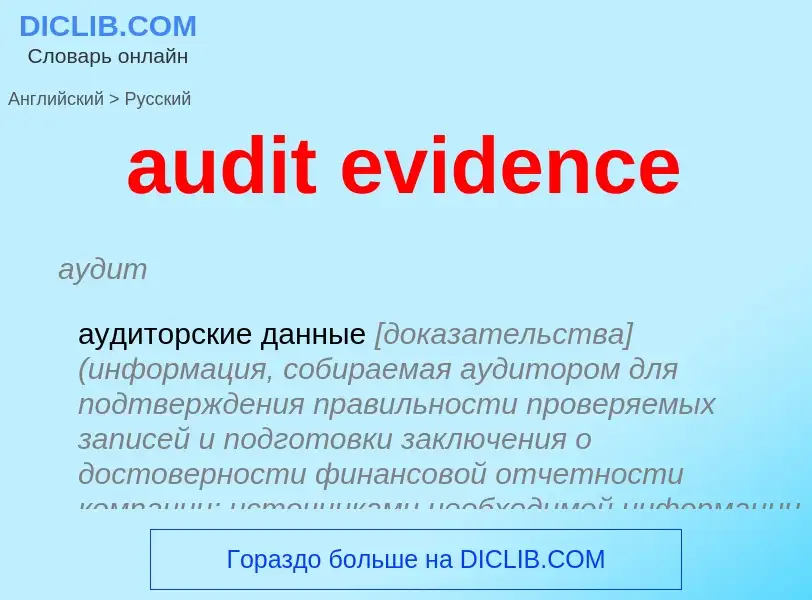Vertaling en analyse van woorden door kunstmatige intelligentie ChatGPT
Op deze pagina kunt u een gedetailleerde analyse krijgen van een woord of zin, geproduceerd met behulp van de beste kunstmatige intelligentietechnologie tot nu toe:
- hoe het woord wordt gebruikt
- gebruiksfrequentie
- het wordt vaker gebruikt in mondelinge of schriftelijke toespraken
- opties voor woordvertaling
- Gebruiksvoorbeelden (meerdere zinnen met vertaling)
- etymologie
audit evidence - vertaling naar Engels
аудит
аудиторские данные [доказательства] (информация, собираемая аудитором для подтверждения правильности проверяемых записей и подготовки заключения о достоверности финансовой отчетности компании; источниками необходимой информации являются первичные документы, инвентаризация активов, информация третьих сторон (напр., адвоката фирмы, поставщиков, кредиторов) и др.)
синоним
Смотрите также
Definitie
Wikipedia
Audit evidence is evidence obtained by auditors during a financial audit and recorded in the audit working papers.
Audit evidence is required by auditors to determine if a company has correct information considering their financial statements. If the information is correct, a CPA (Certified Public Accountant) can confirm the company's financial statements. Audit evidence is the primary support for an auditor's opinion on if there is a reasonable assurance that the company's financial statements are not materially misstated due to fraud or error. Audit evidence consists of various audit procedures and can often have a different role in the different stages of an audit. Audit evidence must be sufficient and appropriate, which means it is reliable and relevant. The auditor must use their own professional judgement when determining if the audit evidence is persuasive and sufficient.
Audit evidence has undergone significant change with the emergence of Artificial Intelligence, Big Data, and audit data analytics. As the field of accounting is transforming, technologies such as AI (artificial intelligence) are playing a role in audit evidence. AI is enhancing the collection of audit evidence due to the large quantities of data that can be processed with very little error. Audit evidence collection is also being improved through audit data analytics, which also provide the auditor the ability to view the entire population of data, rather than just a sample. Viewing greater amounts of data leads to a more efficient audit and a greater understanding of the audit evidence.
Along with audit data analytics, big data has allowed auditors to use more sources for audit evidence and helps increase the quality and efficiency of audits. Alternatively, the quality of the data in these new sources can not always be seen as reliable, which can be a drawback to big data’s contributions.

